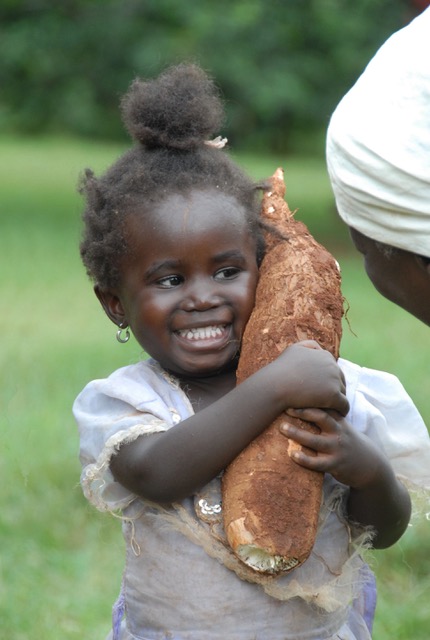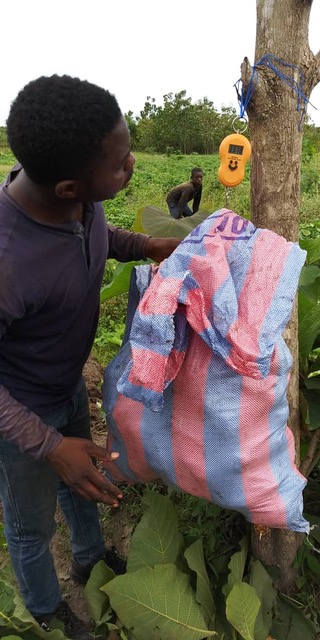Tracking food losses in Africa
APHLIS is assisting four African countries to estimate the postharvest losses of major root and tuber food crops, a first step in developing more sustainable and efficient food systems. Working with partners in Nigeria, Togo, Tanzania and Uganda, the project is investigating cassava and sweetpotato, crops that are critical to the food security of millions but whose losses along the value chain are scarcely understood and often overlooked.
 Cassava is Africa’s second most important staple crop, but very little is known about cassava losses along the value chain. (Credit: Bioversity International\ Y. Wachira)
Cassava is Africa’s second most important staple crop, but very little is known about cassava losses along the value chain. (Credit: Bioversity International\ Y. Wachira)
“Cassava is Africa’s second most important food staple after maize,” according to Dr Aditya Parmar, one of the APHLIS scientists leading the study, “yet it receives a fraction of the research attention given to cereals such as wheat, rice and maize. There are a handful of post-harvest loss studies on root and tuber crops, but these rely heavily on surveys and guesswork, and we have noticed significant data gaps and a high degree of disparity between perceptions and actual losses.”
Assessment teams selected a representative sample of farmers, traders and processors in administrative units (district/village) across different regions in Togo, Nigeria and Uganda. The teams investigated sites in three to four different agroecologies in each country, working with farmers, transporters, and processors to measure and understand the losses occurring during and after harvest in these food systems.
Step-by-step guidelines on the direct measurement of cassava and sweetpotato losses are being used in the studies. The guidelines are consistent with global accounting and reporting standards developed by the Food Loss & Waste Protocol (FLW Protocol), a multistakeholder effort that addresses the challenges in consistently measuring and credibly reporting food loss and waste.
In Africa, cassava and sweetpotato are generally sold as fresh roots or processed into dried products such as gari (ground cassava flour), chips/chunks and tapioca. The assessment aimed to determine losses at all stages along the fresh produce value chain, from harvest to home storage, transport to market storage and retail display as well as the major processed products from cassava, i.e., gari in West Africa and cassava flour in East Africa. The studies were aligned with the cropping cycles and seasons. The assessments used the ‘load tracking’ measurement technique, which weighs the crop at different stages along the value chain to obtain precise measurements of the quantity and quality of produce lost at each stage. These figures can later be converted into percentage losses. All loss estimates generated by the project will be freely available on the APHLIS website (www.aphlis.net).
 Weighing of sweet potato tubers at the harvesting during the loss assessment study in Zio province, Maritime region, Togo (Credit photo author: Kukom Edoh Ognakossan).
Weighing of sweet potato tubers at the harvesting during the loss assessment study in Zio province, Maritime region, Togo (Credit photo author: Kukom Edoh Ognakossan).
While the work is still underway (it is expected to wind up early next year), the impact of the project is already being felt in three of the countries. Understanding where and when postharvest losses occur helps countries anticipate where and what type of mitigation measures are most needed, enabling them to target their investments to fit the evidence. It also allows them to develop more effective national postharvest loss reduction strategies and to track progress in achieving their loss reduction goals. In the 2014 Malabo Declaration, African Union governments committed to cutting current levels of postharvest loss in half by the year 2025. At the global level, the Sustainable Development Goal 12.3 is “to halve per capita food waste at the retail and consumer levels and reduce food losses along production and supply chains, including post-harvest losses, by 2030.”
“Postharvest loss reduction is important for increasing food availability, decreasing pressure on available land and natural resources and ensuring returns on the investments made in production,” said Kukom Edoh Ognakossan, an APHLIS expert who is conducting the Togo study. “The first step in reducing postharvest losses is knowing the magnitude and the type of the losses taking place. The APHLIS project allowed us to assess postharvest losses along entire fresh and processed cassava and sweetpotato value chains in Togo, this is the first time it has ever been done. The assessment used actual measurements, which is quite rare. We were able to identify postharvest loss hot-spots and to document postharvest handling practices along the value chains to determine areas for improvement.” Ognakossan is a postharvest specialist in the Laboratoire de Recherche sur les Agro-ressources et la Santé Environnemental/Ecole Supérieure d'Agronomie, Université de Lomé, Togo.
Other project partners include the Department of Food Science and Technology at the Federal University of Agriculture in Abeokuta, Nigeria, the National Agricultural Research Laboratories (part of the National Agriculture Research Organization) in Uganda, and the Tanzanian Agricultural Research Institute in Tanzania.
“The postharvest study is of great interest to gari processors in Nigeria. The farmer processors are eager to know the outcome of the study in order to determine the unit operations where significant postharvest losses are taking place,” said Abdul-Rasaq Adebowale, a project partner from Nigeria.
The African Postharvest Losses Information System (APHLIS) is the leading international effort to collect, analyze and disseminate data on postharvest losses of cereals, legumes, roots and tubers, including the economic and nutritional dimensions of such losses. APHLIS postharvest loss estimates are available at www.APHLIS.net.
News
Conflict and postharvest losses – the case of Ukraine
27 October 2023
Eighteen months after the Russian invasion of Ukraine, the world faces a massive hunger crisis. The invasion has caused immense suffering for the Ukrainian people and has led to food, fuel, and ferti... Read more ›
Reducing postharvest losses to transform lives: the case of the sorghum value ch...
03 September 2022
Sorghum is a critical crop in Ghana, both for food security and as a source of household income. Mainly grown by smallholders, it is an energy-rich staple that contains essential minerals such as pot... Read more ›
Global agribusiness Olam Agri works with smallholders to measure and reduce loss...
27 June 2022
With a focus on high-growth emerging markets, Olam Agri, the food, feed and fibre global agri-business is determined to improve the sustainability of its supply chains. As a champion of Sustainabl... Read more ›
Policies and strategies to reduce postharvest losses in sub-Saharan Africa: prog...
18 March 2022
The need for more rigorous efforts to reduce postharvest losses is widely recognized. However, policy formulation and implementation are still very slow. Understanding and addressing the reasons behi... Read more ›
Tracking food losses in Africa
03 November 2021
APHLIS is assisting four African countries to estimate the postharvest losses of major root and tuber food crops, a first step in developing more sustainable and efficient food systems. Working with... Read more ›
Side event at the AAPHCE: APHLIS - a tool to support postharvest loss reduction...
08 September 2021
This side event is open to all AAPHCE participants. Introduction Substantial crop losses occur at various stages along the postharvest value chain. The African Union’s Malabo Declarat... Read more ›
Postharvest loss in the era of COVID-19
11 March 2021
Exactly a year ago, the World Health Organization formally named COVID-19 a pandemic. Since then, the virus has swept across the world, leaving over 100 million cases and 2.5 million reported deaths... Read more ›
New APHLIS tool estimates the financial cost of postharvest losses
09 April 2020
(financial values updated 29 July 2022 according to updated price data) Postharvest losses are widely understood to have serious financial consequences for farmers. Such losses waste not onl... Read more ›
APHLIS releases tool for measuring nutritional impacts of postharvest losses
10 December 2019
(updated on 20 March 2020 and 25 February 2021) Postharvest losses do not only squander food, and the land, water, labour and other inputs used to grow crops. A new APHLIS tool reveals the... Read more ›
Postharvest losses and the road to food security
02 September 2019
Food loss includes the physical loss of food as well as quality losses that can diminish the economic value of a crop, or make it unsuitable for human consumption. Food waste, by contrast, refers to... Read more ›